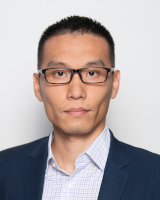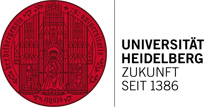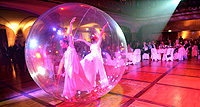"You can learn a lot and do good research at Heidelberg University"

Dr Chen Song, mathematician at the ABB Research Center in Ladenburg, Germany
From 2013 to February 2021 PhD student and postdoc at the Interdisciplinary Center for Scientific Computing (IWR)
When, how long, and in what position did you stay at Heidelberg University?
I arrived in Heidelberg at the end of 2013, shortly after completing my engineering degree in mechanical engineering in France. At that time, I had received a scholarship from the Heidelberg Institute for Theoretical Studies (HITS) so that I could start my PhD in Applied Mathematics at Heidelberg University. From then until June 2018, I worked as a PhD student in the Engineering Mathematics and Computing Lab (EMCL) research group and the Data Mining and Uncertainty Quantification (DMQ) research group, both under the supervision of Prof. Dr Vincent Heuveline at the Interdisciplinary Center for Scientific Computing (IWR) and at HITS. After my PhD defense, I continued working as a postdoc in the same groups until February 2021.
Why did you decide in favour of Heidelberg University?
I chose Heidelberg University because I wanted to do a PhD in applied mathematics, especially in the direction of medical applications. My PhD supervisor, Prof. Dr Heuveline, is well known in this field and has worked on it for many years. In addition, the EMCL group has also developed a high-performance research software HiFlow3. This was a very good fit for my project. The IWR at Heidelberg University is well recognized in the field of scientific computing and also offers an interdisciplinary PhD program, which means that you can do a PhD with an additional focus in another subject. Of course, Heidelberg University also has a world-renowned medical faculty, so there are many opportunities for cooperation.
What did you like best about being in Heidelberg? What suggestions would you have for improvements?
The motto of Heidelberg University is Semper Apertus, which means “always open”. I like this openness very much. There are countless scientific events, so you can easily exchange ideas with other scientists about your research. These discussions have always inspired me. In addition, the city of Heidelberg is absolutely beautiful, I often enjoy walking through the old town. However, finding housing is unfortunately a problem, so more support for international researchers would be nice.
How did your career continue after your time in Heidelberg?
I have been employed at the ABB Research Center in Ladenburg since March 2021 and work there in research and development. I got this position because of my previous experience at the university. During my time in Heidelberg, I got many opportunities to work on various research projects from different fields, which allowed me to deepen my expertise and accumulated experience.
What is your view of the German scientific system in comparison to that of your home country or to that of other countries where you may have conducted research?
On one hand, I think the German scientific system is very performance-oriented like in other countries nowadays, but still the researchers also take good care of teaching. Also, there is a close cooperation between university research and industry in Germany, and many advanced technologies can be quickly applied in industry. On the other hand, the German university administration process is sometimes relatively old-fashioned and not very efficient.
In your opinion, what is the importance of international exchanges for researchers?
International experience is even more important today than it used to be. When applying for a professorship, for example, scientific experience abroad or equivalent scientific collaborations with researchers abroad are also a very important factor. Researchers can always learn a lot from people with different backgrounds, because diversity is completely indispensable for any field of research – that's how the new research ideas are born.
Do you recommend a research visit to Heidelberg University to your students or to colleagues in your scientific network?
Of course! During my time at Heidelberg University, our research group has hosted many research partners and guests from China. Last year, we applied for a DAAD research grant for a PhD student from the Chinese Academy of Sciences (CAS) in Beijing. I always recommend people in my scientific circle to come to Heidelberg University, because you can learn a lot and do good research here.

